The actress/filmmaker tackles the global refugee crisis and far-right politics with a comedy drama set in Brittany.
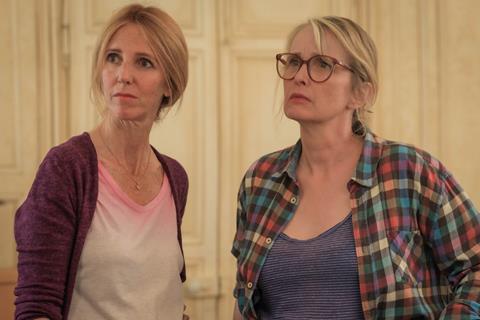
In Meet The Barbarians, Julie Delpy brings her signature sardonic approach to the global refugee crisis in an ensemble comedy about a Syrian family trying to fit in among locals in a small town in France.
The film had its world premiere as the opening film of Angoulême Francophone Film Festival in August and plays in Toronto’s Gala Presentations ahead of a September 18 release in France. It comes in the wake of months of political turmoil in the country that has seen nationalist, anti-immigrant groups on the rise.
Set in and filmed entirely in Paimpont, a tiny town in Brittany, the film – which Delpy describes as “a bit of a left-wing feelgood movie” – takes a mockumentary approach with fictional camera crews filming the townspeople as they gear up to reluctantly welcome a Ukrainian refugee family, only to be shocked when a Syrian family arrives instead.
As well as directing, Delpy leads an ensemble cast that also includes Sandrine Kiberlain, Laurent Lafitte, Ziad Bakri, India Hair and Mathieu Demy; Delpy also co-wrote the script with Matthieu Rumani, Nicolas Slomka and Léa Domenach.
Initial spark
Delpy’s film takes aim at the ingrained prejudices of its more immigration-averse characters. But, she adds, “I don’t spare anyone. The film is fair in that way.”
Even her own character, who she describes as “the woke version of a French villager”, pokes fun at progressives as a schoolteacher who often imposes her more liberal views on her students. “I’m not afraid of offending people, but I want it to be authentic. I like comedy when it has something to say, but I like to send messages without making big statements.”
The initial spark for the film came from watching news coverage of the war in Syria and wondering why other people were not as “shocked and moved” as she was about people uprooting their lives and seeking asylum in other countries. With a number of “powerful documentaries” and “beautiful dramas like Io Capitano” dealing with the refugee crisis, Delpy decided her take on the topic would be through comedy.
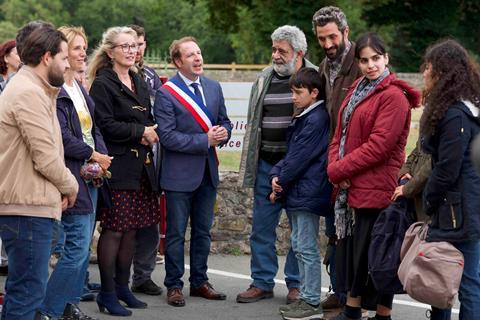
In addition to taking a deep dive into geopolitics during her research process for the script, Delpy interviewed real-life refugees and those who opposed the idea of welcoming them. The script continued to evolve as war broke out in Ukraine, and Delpy was in post-production as France faced ongoing political upheaval at home. The far-right National Rally (RN) party secured the biggest vote share in the first round of recent parliamentary elections, and emerged from the second round with a significant number of seats; the government is still in deadlock heading into autumn.
“We couldn’t believe what was happening as we were finishing the film,” says Delpy. “It is timelier than ever. Two years ago, when I was pushing for it so hard to get made, people said the far right could never win in France. But I could see it coming and look where we are now.”
Delpy reteams with her longtime producer Michael Gentile of Paris-based The Film, who also produced Mehdi Fikri’s 2023 Toronto premiere After The Fire, a family drama about the aftermath of police violence that was the target of a right-wing online smear campaign ahead of its French release last November. While that film was “an easier target because it was a first feature and a drama”, Gentile calls Meet The Barbarians “a gentle, touching comedy that primarily mocks France itself”.
The producer says financing the film was not a challenge even though “the way we welcome migrants is a source of debate and has become a fiery political topic”. French distributor Le Pacte quickly boarded the $4.4m (€4m) feature followed by other partners including Canal+ and Disney+, which will release it in post-theatrical windows in France.
French television groups were more reticent, adds Gentile: “Certain networks told us there are too many films about migrants and that people aren’t interested in the topic.”
Changing times
Gentile and Delpy both say their production partners were all-in from the start and did not apply any pressure to change or cut some of the more politically incorrect dialogue, suggesting that times have changed since Delpy’s second feature as a director, 2 Days In Paris, in 2007.
“It was my first real film and I felt people wanted to censor everything,” she recalls. “There is a scene when I’m in a taxi with my [US] boyfriend and the driver is racist and I say, ‘Welcome to France.’ The distributor was horrified and told me, ‘You can’t put that in.’ They wanted something polished with no politics, but I fought it.”
Today, she continues, “I think people who trust me, trust me to make a film that resonates.”
Le Pacte is planning a wide release for Meet The Barbarians, on around 400 screens in France, with the company’s president Jean Labadie describing it as “an extremely mainstream film”. The firm plans to market it as a comedy while not flinching from showing its politically charged elements. (A scene featuring a rural police officer saying, “Sorry, I don’t speak Macron,” will be used prominently in the film’s online campaign.)
“[Julie’s film] touches on timely topics and doesn’t hesitate to address the faults of the French people, but isn’t a lesson in morality,” says Labadie. “Our definitive marketing message is that living together is difficult, but we can do it.”
Delpy is not worried about any potential backlash in France “because it’s a comedy and it is preposterous to be upset with a clown”.
She adds: “Some people may see a part of themselves in the racist characters and perhaps get upset, and others will think I didn’t go far enough in making certain characters meaner. But I made the film in a way that if they attack me, they’ll seem ridiculous. I want the film to show there are good people out there and that not all French people are racist.”
The self-described “idealist” concludes: “I’m not trying to change the world. I know I don’t have the power to do that. But maybe the film can amuse some people and make them believe that we can all live happily together if we really try.”


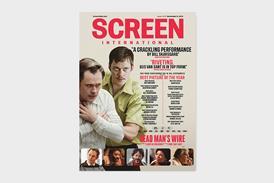
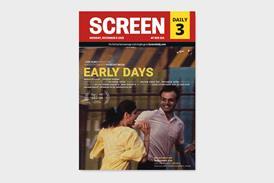


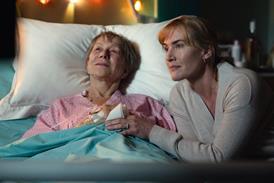
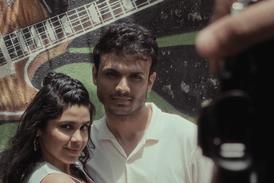





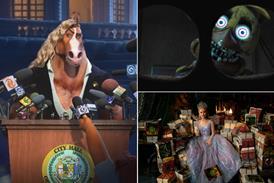
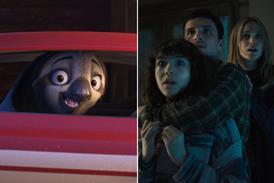

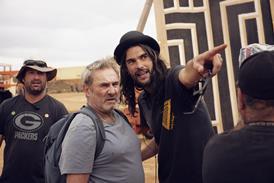







No comments yet